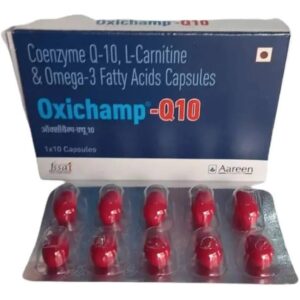L-CARNITINE + OMEGA-3 FATTY ACIDS + UBIDECARENONE (COENZYME Q10)
L-Carnitine: L-Carnitine is a dietary supplement commonly used to support energy production and fat metabolism. It is also known as levocarnitine or vitamin BT. L-Carnitine plays a crucial role in the transportation of fatty acids into the mitochondria, where they are burned for energy.
L-Carnitine is primarily prescribed to address deficiencies in individuals with genetic disorders, certain medical conditions, or those undergoing dialysis. It may also be used by athletes or bodybuilders to enhance exercise performance and aid in weight loss.
The supplement works by helping the body convert fatty acids into energy. It also assists in the removal of toxic byproducts from the mitochondria, thus reducing oxidative stress. Through these mechanisms, L-Carnitine supports energy metabolism and may improve cognitive function and exercise capacity.
The recommended dose of L-Carnitine varies depending on the condition being treated. For deficiencies, the usual dosage is around 990-2,000 mg per day, taken in divided doses. For exercise performance or weight loss, doses ranging from 1,000-4,000 mg per day are commonly used. It is important to follow the instructions provided by a healthcare professional or the product label.
L-Carnitine is generally well tolerated, but some individuals may experience gastrointestinal side effects, such as nausea, vomiting, diarrhea, or abdominal discomfort. These adverse effects are usually mild and temporary. In rare cases, high doses of L-Carnitine may cause a fishy odor in the urine, sweat, or breath.
It is essential to note that L-Carnitine supplements are not recommended for everyone. Individuals with certain medical conditions, such as kidney disease, liver disease, or diabetes, should speak with a healthcare professional before starting L-Carnitine supplementation. Additionally, it is advisable to inform a healthcare provider about any other medications or supplements being taken to avoid potential interactions.
Overall, L-Carnitine is a dietary supplement that supports energy metabolism and fat oxidation. It is commonly used to address deficiencies and may have some potential benefits for exercise performance and weight loss. However, it is important to consult with a healthcare professional before starting L-Carnitine supplementation to determine the appropriate dosage and to ensure it is suitable for individual needs and health conditions.
Omega-3 Fatty Acids: Omega-3 fatty acids are a type of polyunsaturated fat that are found in certain types of fish, such as salmon, sardines, and mackerel, as well as in flaxseed, chia seeds, and walnuts. They are considered essential fats, meaning that our bodies need them for optimal health but cannot produce them on their own.
The primary use of omega-3 fatty acids is to support heart health. These fats help to reduce inflammation in the body, lower triglyceride levels, and improve overall cardiovascular function. They are also believed to have benefits for brain health, cognitive function, and mood regulation.
Omega-3 fatty acids work by altering cell membrane composition and regulating various physiological processes, such as lipid metabolism and gene expression. They also have anti-inflammatory effects by inhibiting the production of pro-inflammatory molecules in the body.
The recommended dose of omega-3 fatty acids varies depending on the individual’s health status and goals. For general health maintenance, a daily dose of 250-500 milligrams of combined EPA (eicosapentaenoic acid) and DHA (docosahexaenoic acid) is often recommended. However, higher doses may be necessary for specific conditions, such as managing high triglyceride levels or reducing inflammation. It’s best to consult with a healthcare provider for personalized dosing recommendations.
Side effects of omega-3 fatty acids are generally rare and mild. The most commonly reported side effects include fishy aftertaste, burping, and gastrointestinal discomfort. Taking high doses of omega-3 fatty acids can also increase the risk of bleeding, so caution should be exercised in individuals taking blood-thinning medications or those with bleeding disorders.
In summary, omega-3 fatty acids are essential fats that play a crucial role in supporting heart and brain health. They can be obtained through diet or taken as supplements. With their anti-inflammatory effects and various physiological benefits, omega-3 fatty acids are widely recognized for their overall health benefits. However, it’s important to follow recommended dosage guidelines and consult with a healthcare provider before starting any new supplement regimen.
Ubidecarenone (coenzyme Q10): Ubidecarenone, also known as coenzyme Q10 (CoQ10), is a naturally occurring substance found in the body that plays a vital role in energy production. It is also available as a dietary supplement.
Ubidecarenone is commonly used as a supplement to support various conditions such as heart disease, high blood pressure, and migraines. It is also used to improve exercise performance, enhance fertility, and boost overall energy levels. Additionally, some people take CoQ10 to counteract the side effects of certain medications, particularly statins.
The exact mechanism of action of ubiquinone is not fully understood. However, it is believed to work as an antioxidant, protecting cells from damage caused by harmful free radicals. CoQ10 is also involved in the production of adenosine triphosphate (ATP), which is the primary energy source for cellular functions.
The recommended dosage of CoQ10 depends on the specific condition being treated. For general health and well-being, doses range from 50 to 300 mg per day. However, for certain medical conditions, higher doses may be required. It is important to follow the instructions provided by your healthcare provider or the product label.
Ubidecarenone is generally well-tolerated, with few reported side effects. However, some individuals may experience mild gastrointestinal symptoms such as nausea, diarrhea, or stomach upset. It is also reported to have a mild blood-thinning effect, so caution should be exercised in patients already taking anticoagulant medications.
As with any supplement or medication, it is important to consult with a healthcare professional before starting CoQ10, particularly if you have any underlying medical conditions or are taking any other medications. They can provide personalized advice and guidance based on your specific health needs.

